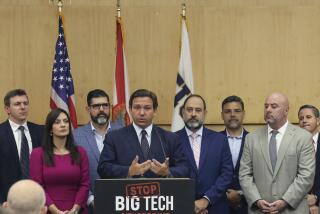Opinion: What the ‘Internet Slowdown’ missed about Net neutrality
Remember the day the Internet went dark, kinda sorta? Thousands of popular websites blacked out at least part of their content in January 2012 to raise awareness of (and opposition to) PIPA and SOPA, a pair of overbroad bills in Congress to curb piracy on foreign-based sites.
The activists behind the blackout reprised the tactic Wednesday, persuading a range of sites to warn the public about a looming “Internet slowdown.” The threat this time comes from the Federal Communications Commission, which has proposed a new rule on Net neutrality.
Keeping an open Internet is crucial to society, a point that both The Times’ editorial board and I have made multiple times over the past seven years or more. But the “Internet slowdown” protests muddied the water by getting some key details wrong and leaving out other important facts.
First, nothing in FCC rules today stops Internet service providers from creating “fast lanes” or “slow lanes.” This is an important point that Net neutrality activists gloss over. The courts threw out the two previous efforts by the commission to require ISPs to manage traffic on the last mile in a neutral way. So technically, ISPs that want to strike deals with content companies to prioritize their traffic can go ahead and do so, as long as they don’t behave in an anticompetitive way.
Second, in light of that first point, the FCC’s proposed rule wouldn’t grant ISPs any permissions they don’t already have. Instead, it would try to narrow the kinds of deals the ISPs could strike with content and service providers by requiring that they not be commercially unreasonable. That’s a case-by-case determination, and under the rule the commission would have to consider the deal’s effect on competition, innovation and free expression, among other things.
Nuance undermines a rallying cry, however. Hence the participants in Wednesday’s protests drew a more threatening picture of what the commission had put on the table. “Etsy opposes the FCC’s proposed rule to let big companies pay for faster access to consumers, leaving small independent businesses in the Internet slow lane,” declared Etsy.com, a marketplace for handmade goods, at the top of its home page “Will you join us in the fight to protect an open Internet?”
Again, in the absence of viable Net neutrality rules today, big companies can already pay for faster access to consumers. The FCC’s proposal aims to put some limits on such deals without flatly ruling out all potential partnerships between ISPs and the companies providing content and services online. That’s because the D.C. Circuit Court of Appeals told the commission in January it couldn’t do so, at least not as long as last-mile ISPs were classified as “information services” subject to lighter federal regulation.
Third, the right question to ask is whether the FCC’s approach is the best way to protect Net neutrality. The two alternatives out there to the FCC’s current proposal are to do nothing, trusting the market to preserve a vibrant Net, or to take a more severely regulatory approach that would treat last-mile ISPs as if they were the local phone monopoly of yore. The latter is known as the “Title II” approach, because it would reclassify last-mile ISPs as “communications services” subject to Title II of the federal Communications Act.
Backers of the trust-the-market approach wave the “Don’t Regulate the Internet!” flag often flown by many of the folks advocating for Title II reclassification. To them, the fact that there have been only a handful of alleged violations of Net neutrality is proof that the current hands-off approach is working. They also argue, with some credibility, that antitrust laws already prohibit the sort of anticompetitive shenanigans that sites such as Netflix warned about on Wednesday.
Supporters of the Title II approach reject the market-based solution out of hand, and contend that there’s simply no way the commission can protect Net neutrality as long as ISPs were treated as information services. In particular, they want the commission flatly to bar ISPs from prioritizing traffic for a fee, averting the possibility of “toll lanes” (or “fast lanes and slow lanes”) online.
Of course, there’s no guarantee the courts would permit the FCC to bar paid prioritization under Title II, either. Phone companies offered all manner of toll lanes in the pre-broadband days. The only restriction was that they do so on the same terms to all customers. In other words, anyone willing to pay the published rate could buy faster data speeds than the phone companies provided the rest of the great unwashed.
FCC Chairman Tom Wheeler has said he wants to come up with a rule that can pass muster with the courts while still accomplishing everything that the FCC’s last rule tried to accomplish. That’s the right goal, and it’s worth debating whether the rule he proposed in May would achieve it. Unfortunately, that’s a complicated and legalistic debate, not the kind of thing that promoters of the “Internet slowdown” seem to have in mind.
Follow Healey’s intermittent Twitter feed: @jcahealey
More to Read
A cure for the common opinion
Get thought-provoking perspectives with our weekly newsletter.
You may occasionally receive promotional content from the Los Angeles Times.







